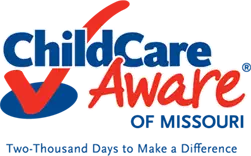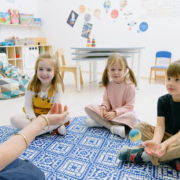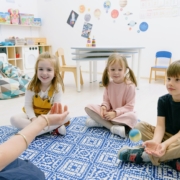9 Essential Kinds of Child Care Providers Training
 We probably don’t have to tell you that child care providers training is one of the most vital ways of ensuring our children are well cared for. When child care providers have the appropriate knowledge and skills, they can use their expertise to provide the highest quality care for all the children they are charged with.
We probably don’t have to tell you that child care providers training is one of the most vital ways of ensuring our children are well cared for. When child care providers have the appropriate knowledge and skills, they can use their expertise to provide the highest quality care for all the children they are charged with.
As such, many states require a certain number of child care providers training hours each year. In Missouri, you need to log 12 clock hours of approved child care providers training in order to remain a licensed caregiver. Not all of the types of child care providers training on this list will fulfill that requirement, but they are all programs that will make you a better child care provider, which is its own reward.
Some of the programs listed here are geared more toward getting you ready to start your career as a child care provider, while others are intended for those who are already established in the field. Skim through and identify which ones would best suit your needs, then you can use that as a jumping off point for the kinds of child care providers training that you want to pursue. We’ve included information about ways you can get help paying for some of these programs where appropriate, like a CDA scholarship (more on that later).
Okay, with all those caveats out of the way, let’s get into it. Here are nine child care providers trainings that can help take your career to the next level.
1. CPR and First Aid
This is likely the most basic child care providers training course out there. CPR and First Aid classes are very common and very easy to find. Not only is it an essential child care providers training, but it’s also vital to many other types of positions.
You’ll learn a lot of valuable skills in this type of course. By the end, you should be prepared to react in emergency situations and provide the right kind of care. There are special instructions when it comes to CPR for children and infants, so you should make sure the course you take covers those, too.
We decided to start with this one because it’s easily accessible, vitally important, and it’s also required by the state of Missouri. To count for those state requirements, the training must be conducted at least partially in person. You also have to take the training from one of the approved models (you can find the list here).
CPR and First Aid training will count toward your annual clock hours as long as the person or organization that trains you was approved by the Section for Child Care Regulation. If you opt for a CPR and First Aid course that is partially online and partially in person, the online portion will not count toward those clock hours.
2. Water Safety
Maybe you don’t anticipate being in the water in your child care job, but adding on water safety skills to your child care providers training can be a nice bonus. It might open up all kinds of other opportunities for you. Plus, it’s better to be over prepared than underprepared. If you ever find yourself in a situation where you need to watch children around a body of water, you’ll be glad you took this type of training, even if it seemed unnecessary at the time.
Much like CPR and First Aid training, this sort of course is not all that difficult to come by. You’ll learn how to reduce the risk of drowning as much as possible with a focus on young children, and you’ll learn various concepts and techniques for how to prevent a tragedy in the water. There’s also often an emphasis on applying these ideas and methods to common situations you might encounter. By the end of the training, you should be fairly confident in your abilities to keep children safe around pools and other bodies of water.
This probably isn’t the first training you think of or one of the first you should complete on your journey to becoming a child care provider, but it’s a nice one to add on, especially if your job involves water. This next kind of child care providers training, however, is one that’s absolutely essential.
3. Sleep Safe Training
The state of Missouri requires this type of course for child care facilities that are licensed to care for kids less than one year old. You’ll need to take this class once every three years to stay up-to-date on all the latest best practices. These will also count toward your yearly clock hours. There’s a list of approved providers that you can find here, if you’re interested.
In one of these trainings, you’ll learn all about how to keep infants safe while they’re sleeping. You’ll learn about the position they should be in (on their backs), what should be in the crib with them (essentially nothing), and all the other essential information on making sure babies are sleeping properly and with the lowest chance of harm.
In 2019, about 1,250 infants died of Sudden Infant Death Syndrome in the United States, and another 960 died due to accidental suffocation and strangulation in bed. In a sleep safe training course, you’ll learn best practices to prevent more avoidable infant deaths. We’ll talk about other child care providers training programs that are geared toward those caring for the youngest kids a little later, but a sleep safe training is a great place to start if you want to work with babies.
4. DHSS Online Training
This is less a type of child care providers training and more of a training resource. The Department of Health and Senior Services offers a variety of online courses to help you fulfill your clock hour requirements. They cover a range of topics — licensing, social and emotional health, poison safety, transportation, and more.
Even though these are completely online, they will count toward your yearly clock hours, and each course should tell you how many hours you’ll receive before you begin. There are quite a lot of rules and regulations regarding these, so make sure to read through them before you get started. All that information can be found here.
5. Youth Nutrition Specialist
Everybody has to eat, and making sure kids eat well is a key part of effective child care. Although these types of certifications are typically geared more toward existing nutritionists and health professionals, it can also be an addition onto your other child care providers training programs. You’ll learn about how to create nutritional plans and strategies for individual kids and all the things that go into that, which will support kids’ healthy growth.
Unlike the CDA and CDA scholarship opportunities, which we’ll get into in more depth later, there aren’t very many financial aid options here. If you want to earn a degree in nutrition or a related field, that’s a bit of a different story. With just a certification, though, you’ll likely be on your own to cover the cost.
6. Certified Children’s Fitness Specialist
Much in the same vein as the youth nutrition specialist training, this one is not a required child care providers training, and it might not be one everyone’s interested in. Especially if you’re going to focus on caring for infants, fitness training might seem unnecessary to your career.
However, it might be a good add-on training if you’re passionate about getting kids moving. Childhood obesity affects one out of every five children and adolescents in the United States, making it a huge issue to tackle. This isn’t just a problem for older kids, either — the CDC’s most recent data shows that obesity affected 13.4 percent of 2- to 5-year-olds.
Again, like the nutrition certification, you’re probably going to have to pay for this one on your own. There are a lot of different organizations out there that provide this sort of training, though, and they come at various price points. Make it happen if your calling is increasing kids’ fitness levels.
7. Special Needs Care
Although this type of training isn’t required, it’s essential to making sure all children are cared for properly. There are a few options for this in Missouri. One is to look on the Missouri Workshop Calendar to find an inclusion specialist providing training, which will count toward your required clock hours. The other is to contact the inclusion specialist in your region and set up a session with them. That course will cost a small fee. The plus side, though, is that it’s so small most people shouldn’t have any trouble paying it and don’t need a program like a CDA scholarship. Which brings us to our next form of child care providers training…
8. CDA
One way to prove that you’ve had adequate child care providers training is by achieving your Child Development Associate (CDA). That’s a well-recognized credential that includes exam, observation, and portfolio components. We’ve been mentioning it and CDA scholarship opportunities throughout because it’s one of the most comprehensive child care providers trainings on this list. If you earn a CDA, you’ll be signaling to the world and your profession that you have the knowledge and skills to provide high-quality child care, and that you’re dedicated to your profession.
CDA Scholarships
If you need help paying for the program, you might be eligible for a CDA scholarship. The CDA costs $425 for an online application and $500 for a paper application, and that’s not including all the professional education hours you need to have completed before you ever submit an application. That can make it prohibitively expensive for some looking to break into the child care field.
That’s why a CDA scholarship can be so beneficial. CDA scholarships are available through several different programs, and the CDA scholarship you opt to apply for will depend on how you want to earn those hours. Some states will offer a CDA scholarship to anyone who is income eligible, paying for some or all of your training, and potentially covering the assessment fee, as well. You should check with your state to see if you’d be a good candidate for their CDA scholarship program, if they have one.
If your state doesn’t have a CDA scholarship program, don’t let that stop you from achieving this designation. You should look into any other CDA scholarship options that might be available to you — reach out to your local child care resource and referral organization to get help.
9. Newborn Care Specialist Association Certification
This will be a helpful child care providers training if you want to work with infants. They require specialized care, so even if you’re great with slightly older children, it helps to familiarize yourself with their specific needs. That’s what this type of child care providers training accomplishes.
To achieve this certification, you have to pass the exam set by the NCSA. To be able to do that, you’ll need to have taken the correct courses.
Unlike a CDA scholarship, an NCSA scholarship might come from the organization itself. You’ll need to contact them for more information about that, but if you can show that you need help paying for the training, the NCSA might offer you a scholarship.
Child care providers training is vital.
This list of potential training opportunities is far from exhaustive. There are nearly countless ways you can improve your abilities as a child care provider, and these are just a few of the most common, most important, and most accessible ones. We’ve taken you through opportunities that are quick classes and others that are intensive programs. We’ve also pointed out where you might have a good chance of getting help paying for those programs, like with a CDA scholarship.
We definitely encourage you to do more research into any of these training courses that you think could advance your career or just make you a better child care provider. If you have any questions or need any resources, don’t be afraid to reach out to us here.












